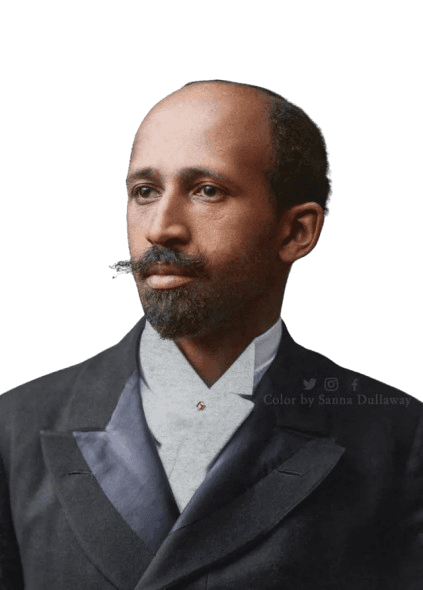Life and achievements
Early life
W. E. B. Du Bois was born in Great Barrington, Massachusetts, in 1868. His family was among the few black families living in the town, and although at times he faced racism, Du Bois was not exposed to racism in its worst form during his early years. Du Bois was left by his father when he was two and was raised by his mother; the community and the teachers recognized his accomplishments and urged him to attend college.
With local funds, he went to Fisk University in Nashville, where he encountered more severe forms of racial discrimination in the South. It made him even more passionate about the fight for equality for black people. After Fisk, Du Bois went to Harvard University and obtained his second bachelor's degree and a PhD, making him the first black man to do so. Studying in Germany also helped him gain the experience and knowledge he later used when writing about Pan-Africanism and socialism. Early in his career as a scholar, he wrote original works on Black communities, such as The Philadelphia Negro, which offered one of the first sociological analyses of African Americans in the United States.
Legacy
W. E. B. Du Bois significantly impacted civil rights, sociology, and African American intellectual tradition. As a scholar, he pioneered the use of empirical data to document the plight of black Americans in such works as The Philadelphia Negro and Black Reconstruction in America. His idea of 'double consciousness' explained the psychological strains that black Americans have to go through under the system of racism, and his idea of 'Talented Tenth' was his call for the blacks to pursue education.
Du Bois was a founding member of the NAACP. Therefore, his impact transcended as he became a voice for political change. His editorship of The Crisis was used to help the civil rights movement and draw attention to lynching, voting rights, and other abuses of black people. His later life involved him supporting Pan-Africanism, socialism, and anti-colonialism worldwide, meaning he was a racial justice man internationally. His work is still relevant and applies to areas such as race relations and economics; his writings are still seminal in African American studies.
Milestone moments
Feb 20, 1903
The Souls of Black Folk Published
Du Bois's The Souls of Black Folk was published in 1903 and contains essays that oppose the notion of racial submission.
In this work, Du Bois developed the idea of "double consciousness," which refers to the conflict that black people feel as they are both black and American.
It was a significant landmark in African American intellectual history and a response to the philosophy of Booker T Washington, who believed in the educational advancement of blacks through industrial education and racial accommodation.
Du Bois, however, called for citizenship and college education rights and said that African Americans should demand their rights, not surrender.
Du Bois' The Souls of Black Folk is one of the most significant works in African American literature and sociology.
Nov 25, 1909
Founding of the NAACP
In 1909, Du Bois assisted in the formation of the National Association for the Advancement of Colored People (NAACP), a significant development in the struggle for civil rights.
Du Bois was hired as the director of publicity and research and became the editor of the organization's magazine.
The magazine was an instrument through which Du Bois promoted the cause of race and elicited the country's conscience on lynching, segregation, and voting for black people.
Thus, under Du Bois's influence, the NAACP became one of the most influential organizations in civil rights and a critical participant in the legal battle against segregation and discrimination in the United States in the 20th century.
Jul 25, 1919
Pan-African Congress in Paris
In 1919, Du Bois convened the first Pan-African Congress in Paris, thus demonstrating his desire to fight colonialism and racism internationally.
The Congress assembled scholars of African and Caribbean descent and American scholars to deliberate on the future of Africa and its diaspora in the post-World War I era.
Du Bois's leadership in the Pan-African movement paved the way for later African anti-colonial movements.
This was one of the most critical stages in Du Bois's career as he broadened his focus on race problems to the international level and the suffering of people of colour.
His work in pan-Africanism would go on for the rest of his life, and he would inspire other leaders of independence movements in Africa.
Nov 25, 1935
Black Reconstruction in America Published
Black Reconstruction in America was published in 1935, and in this work, Du Bois gave a new view on the Reconstruction period.
Du Bois stated that the post-Civil War Reconstruction was a period of significant political achievement by Black people, contrary to the general perception that it was a disaster due to the mismanagement of the Black leaders.
The book described the economic and political situation in the United States at the time, focusing on the agency of African Americans and their efforts to reconstruct the South.
This work was instrumental in shaping later historians' perceptions of the Reconstruction period.
